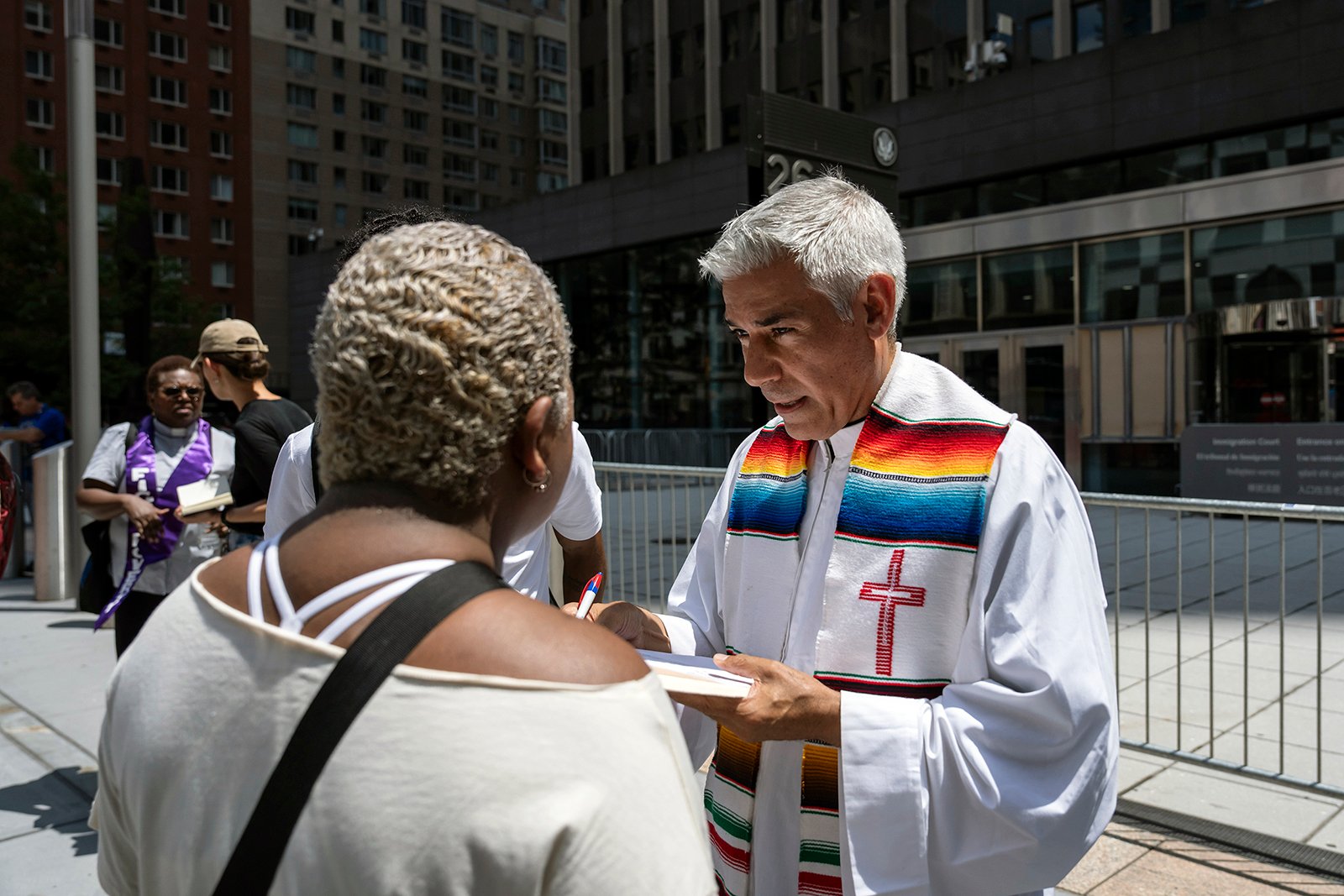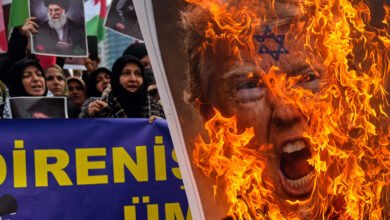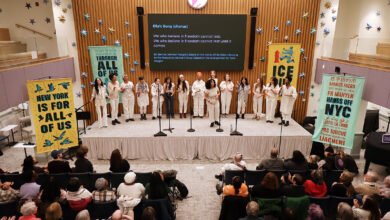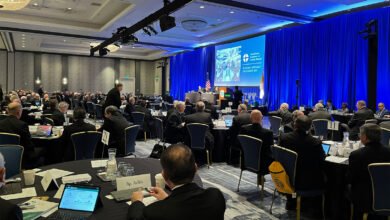(RNS) — When the Rev. Tanya Lopez talks about the day in June when she had to confront masked agents in her church parking lot, she focuses on the man they detained. As the pastor of Downey Memorial Christian Church near Los Angeles, California, she said her primary concern was the person being taken away by the apparent federal immigration agents, though they declined to identify what agency they worked for.
But the fact that agents felt comfortable apprehending a man on church property — and were willing, Lopez says, to raise a weapon at her even after she identified herself as a pastor — left her shaken.
“This is domestic terror, in my opinion,” Lopez told Religion News Service in June. “I don’t feel safe. I still have to show up at church on Sunday. I still have to lead worship.”
It’s a sentiment shared by a growing number of faith leaders and the communities they serve, as President Donald Trump has enacted a massive immigration crackdown over the past few months, resulting in thousands of detentions and deportations across the country. For many immigrant-heavy congregations, the risk has been amplified by the administration’s decision to rescind a long-standing internal government policy of avoiding immigration raids at “sensitive locations” such as houses of worship.
RNS has identified at least 10 instances of apparent immigration enforcement activity conducted by ICE or other federal agents on or immediately near church grounds since Trump’s inauguration. DHS officials have repeatedly declined to confirm whether many such incidents — enacted by uniformed men in masks who sometimes do not identify which agency they work for — were government-sanctioned operations. The episodes are spread across five states and Puerto Rico and, so far, have impacted Christian communities — namely, Catholic, evangelical, Cooperative Baptist and mainline Christian churches.
The episodes have occurred despite four separate lawsuits involving dozens of religious denominations and groups that have been filed against the Trump administration, arguing that any enforcement on church grounds violates the right to freely worship and hinders their ability to serve those in need.
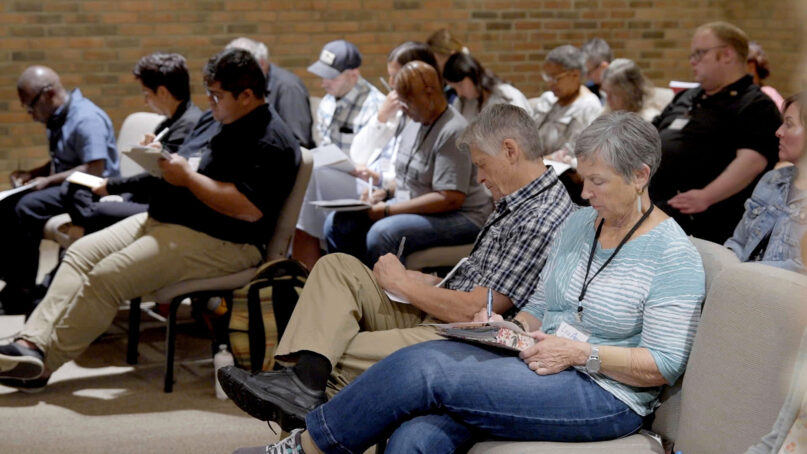
In this image taken from video, participants take notes during a training hosted by Undivided at Central Christian Church in Springfield, Ohio, aimed at teaching community and church leaders how to support and shelter immigrants facing deportation, Tuesday, July 29, 2025. (AP Photo/Obed Lamy)
Trump administration officials initially denied ICE raids were happening at houses of worship at all. But last week DHS Assistant Secretary Tricia McLaughlin acknowledged to RNS that incidents have occurred, while insisting officers need “secondary supervisor approval before any action can be taken in locations such as a church or a school.”
McLaughlin added: “We expect these to be extremely rare.”
Faith leaders aren’t finding them rare enough. The Catholic Diocese of San Bernardino reported at least two instances in June alone where ICE detained people on parish property: one in which agents chased men into the parking lot of St. Adelaide Parish and detained them, and another where a parishioner at Our Lady of Lourdes was apprehended on church property while doing landscaping.
A similar situation unfolded in Washington state in March, when a man was reportedly arrested in a church parking lot while leaving worship with his family.
Agents are sometimes confronted by clergy, but faith leaders say officers are often unmoved by their appeals. Lopez, the Downey Memorial Christian Church pastor who filmed the masked men in a clip that received national media attention, said that one agent allegedly told an administrative pastor: “The whole country is our property.”

Immigration agents, who failed to identify themselves, detain an individual in the parking lot of Downey Memorial Christian Church, Wednesday, June 11, 2025, in Downey, California. (Photo by Tanya Lopez)
Federal agents have also used religious facilities as a staging ground. In May, ICE agents staged an operation on United Methodist church property in Charlotte during preschool pickup, disrupting families and instilling fear among staff and children, according to a statement from the Western North Carolina Conference.
“ICE enforcement activity on our church property interferes with our ability to welcome the stranger, serve our neighbors, and carry out the ministries that are central to our faith,” the statement read. “Churches should not be staging grounds for law enforcement. They are sacred spaces where the hurting find healing, the hungry are fed, and families — regardless of immigration status — come seeking peace.”
Two months earlier, immigration officials reportedly attempted to conduct a stakeout on the grounds of a North Carolina Cooperative Baptist Fellowship church that offered English as a Second Language classes to immigrants and refugees. The officers eventually left, but the incident became a legal flashpoint: the CBF is a plaintiff in one of the lawsuits challenging the Trump administration’s decision to rescind the sensitive locations policy, raising questions as to whether the incident violated a judge’s injunction in their case.
Immigration officials have also conducted raids in close proximity to churches, a trend faith leaders say can have an equally chilling effect on people in the pews. In January, ICE agents reportedly approached an evangelical church in Georgia during worship. When people inside locked the doors, an asylum seeker’s ankle monitor began buzzing. The congregant exited to the parking lot, where he was promptly detained by agents.
Similar scenes played out in June when one man was detained on the sidewalk outside a Catholic church in Downey and, days later, in Newberg, Oregon, when another man was apprehended on the sidewalk just outside St. Michael’s Episcopal Church, sparking backlash from congregants who knew the man and his family.
For some churches, the fear of raids has forced fundamental changes in how they operate. The bishop of San Bernardino has formally lifted the obligation to attend Mass for Catholics concerned about ICE raids, for example, an unusual shift that follows a similar, albeit less formalized move by the Diocese of Nashville.
Rodrigo Cruz, the executive assistant to the United Methodist Church’s North and South Georgia annual conferences, said widespread ICE activity in his state has pushed congregations back to pandemic-era worship strategies — online services or small gatherings — as at-risk families prioritize safety over communal worship.
“We want to gather with people, especially when we are going through some distress as a society, while also acknowledging that the safety and the well being of our individuals and our families are a priority,” said Cruz, who noted the North Georgia conference is a plaintiff in one of the four lawsuits challenging the policy change.
Bishop Brenda Bos, who leads the Southwest California Synod of the Evangelical Lutheran Church in America, told RNS that church attendance in the region sank in the weeks during which Los Angeles — which is within her synod — became the epicenter of Trump’s recent immigration crackdown.
Bos, who is also a plaintiff in the most recent lawsuit, said the drop-off impacts more than just the numbers in the pews. Community ministries are also suffering, she said, in part because immigrants make up a significant percentage of church volunteers in the region.
“It’s not just ‘Oh, I’m a hungry person who doesn’t dare leave my home,’” Bos said. “Some of these people also drive the trucks to go get food, or cook the meals or care for the children. So ministries are stopped also.”
In Puerto Rico, the Rev. Nilka Marrero has watched several families at Iglesia Metodista in San Pablo skip worship out of fear of being detained while en route. In response, the congregation has worked to arrange transportation to help people feel safe. When agents appear near her church, she barricades worshippers inside.
“When they are that close, we shut the church and we lock the (door), enclose ourselves inside, and we can be very happy for two, three, four, five, six hours until I know that they’re not there,” the Methodist pastor said.
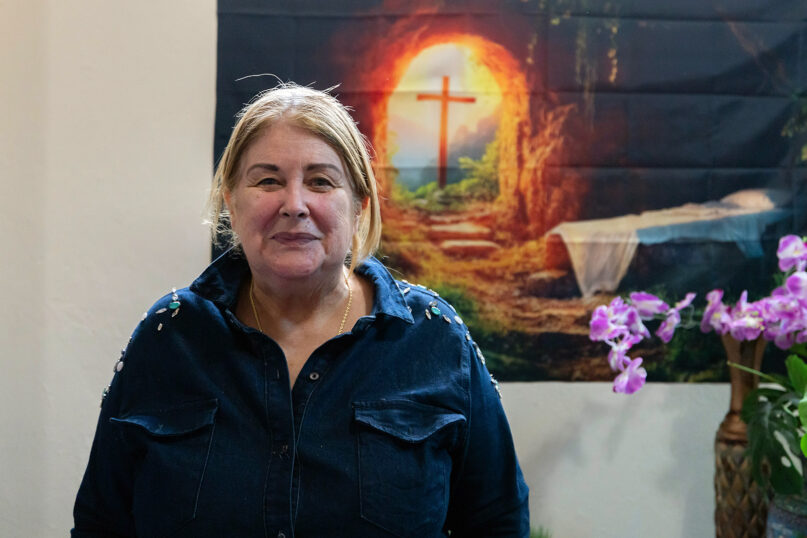
Pastor Nilka Marrero poses for a photo at Barrio Obrero’s San Pablo Methodist Church, where she has been helping undocumented immigrants prepare for the threat of arrest, in San Juan, Puerto Rico, Friday, March 14, 2025. (AP Photo/Alejandro Granadillo)
Rebecca González-Ramos, the special agent in charge of Homeland Security Investigations in San Juan, has said she doesn’t intend to raid churches, but Marrero said many in her congregation don’t trust authorities.
“They’ve arrested people in front of the church,” Marrero said, noting that hundreds of people have been detained in her part of Puerto Rico over the past few months.
The fear permeating her community, the pastor argued, is well-founded: One of the first major immigration raids in Puerto Rico under the new Trump administration happened on a Sunday morning, when many are on their way to worship.
“I’m sorry, I’m old school: Sunday, for me, is the day of the Lord, and it was very, very disrespectful,” Marrero said. “People from my church and other churches saw that as a transgression of what we had been taught all our life: that Sunday is a day when you go out to adore the Lord.”
Aleja Hertzler-McCain contributed to this report.
Source link
